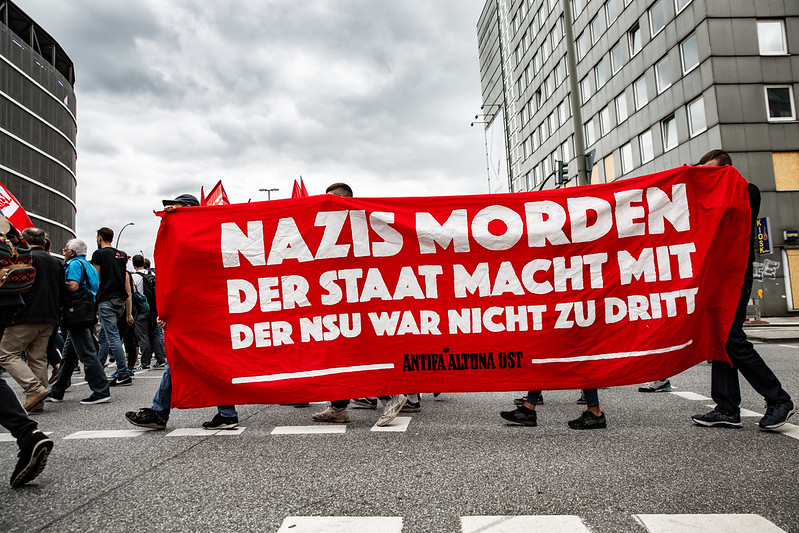By Nery Ramati
The need to develop legal tools in order to cope with the dangers of online extremism and terrorism has been an issue that has kept legislators, government officials, and security forces around the globe very busy in recent years. In liberal democracies, the legal challenges are intensified due to the obvious dangers to the right to privacy and freedom of speech that is imbedded in any legal mechanism dealing with online speech. Although both the UN and the EU have suggested a unified plan to fight online extremism, and many of the liberal democracies have applied the same legal techniques worldwide, the legal history of each country has impacted the way countries prioritise its preferred legal approach. This series of three posts traces the roots within the histories of France, the US and Germany that have shaped their policies regarding the legal fight against online extremism.
The rise of National Socialism, as well as the Second World War and its devastating consequences, for Germany and the whole world, has of course had a profound impact on the shape of the modern German legal system. The historical lesson learned from the possibility of extremist forces using the democratic system in order to rise to power has led to Germany developing, in part, a model of defensive democracy. The response can be seen in the creation of a strong constitution with checks and balances between the different branches of the state.
Understanding the importance of freedom of speech as an essential component in the democratic process has led to the inclusion of this right in the constitution, but in a dramatically different way to US constitutional protections.
The right to freedom of speech is protected by Article 5 of the German constitution, which declares that every person shall have the right to “express and disseminate his opinions in speech, writing and pictures, and to inform himself without hindrance from generally accessible sources”. But freedom of speech, like many other rights in the German constitution, can be limited by regular law in order to protect the constitutional state.
The historical lesson that was learned from the Nazi period about how dangerous propaganda and the incitement of anti-democratic forces can be to democracy has led to the German legal system’s intolerance of hate speech. The German Criminal Code includes several articles, dating from as early as the 1950s, which limit freedom of speech in the name of protection of democracy.
Section 86 of the Code forbids the dissemination of propaganda material by unconstitutional organisations, while Section 86a forbids the use of the symbols of unconstitutional organisations such as the swastika or other neo-Nazi symbols, with the ISIL flag added to the list of banned symbols in 2014.
Section 90a forbids the defamation of the state and its symbols such as its flag while Section 91 forbids the displaying or supplying of material “which by its content is capable of serving as an instruction to the commission of a serious violent offence endangering the state (Section 89a (1)), if the circumstances of its dissemination are conducive to awakening or encouraging the preparedness of others to commit a serious violent offence endangering the state”.
In addition, Section 111 forbids the inciting or committing of an unlawful act “publicly, in a meeting or through the dissemination of written materials”, and Section 129a forbids the forming of a terrorist organisation.
Section 130, 130a and 131 deserve special attention as they all deal directly with limitations on publication. Section 130, which is entitled ‘incitement to hatred’ forbids the inciting of hatred against a national, racial, religious or ethnic group, forbids insulting someone based on being a member of one of those groups and forbids the public approval of, denying, or downplaying of an act committed under Nazi rule.
Section 130a forbids the dissemination, public display, posting, presenting, or the otherwise making accessible of material that is capable of serving as an instruction for an unlawful act and intended by its content to encourage or cause others to commit such an act.
Section 131 forbids the dissemination of materials “which describe cruel or otherwise inhuman acts of violence against humans or humanoid beings in a manner expressing glorification or which downplays such acts of violence or which represents the cruel or inhuman aspects of the event in a manner which violates human dignity”.
A major part of these laws are enforced by a special security agency that is designated to protect the constitution from threats, the Federal Office for the Protection of the Constitution (the BfV).
With such a wide range of criminal laws prohibiting many forms of expression, laws which were mostly put in place prior to the rise of the Internet, it is no surprise that the German authorities have chosen the criminal law path to deal with online extremism. For example, the BfV’s 2018 annual report states that out of 36,062 politically-motivated offences in 2018, 14,088 were propaganda offences, which were mostly performed online.
The German fear of the power of extremist propaganda is understandable and the use of criminal law against online users is also common in other European countries, but the question remains, do criminal limitations on free speech really stop the spreading of extreme ideas, do they have the opposite reaction, or do they have no effect at all? As extremist ideas continue to flourish in many democratic countries around the world, regardless of various legal efforts, it is perhaps time to consider if the law is the place to find the solution.
This article is the third and final of the three part series. Click here for part 1 and 2.
Nery Ramati is a VOX-Pol researcher, attorney, and former partner in Gaby Lasky and Partners Law Office, a leading Israeli human rights law practice, specialising in freedom of expression and protest.
